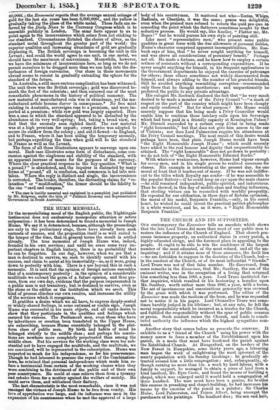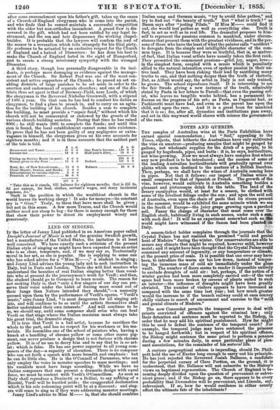THE CHURCH AND ITS SUPPORTERS..
OUR contemporary the Examiner tells an anecdote which shows- that the late Lord Truro did more than most of our publio men to restore the influence of the Church of England. That church pos- sesses immense property, an authorized status in every parish, a highly-educated clergy, and the foremost place in appealing to the people. It ought to be able to win the confidence of the largest number of the most educated, of the meat refined, and all the an,- inquiring: and if it attains none of these successes, the fault lies —we are forbidden to suppose in the doctrine of the Church, but— in the conduct of the Church, or of its most influential " friends." Lord Truro was not of that false number. He discovered, from some remarks in the Examiner, that Mr. Southey, the son of the eminent writer, was in the occupation of a living that returned him something less than 1001. a year. Lord Truro instituted fur- ther inquiries, which resulted in his bestowing a benefice upon Mr. Southey, worth rather more than 281)1.-a year, with a house. The act of spontaneous and conscientious generosity was crowned by the grace with which it was performed. The editor of the Exanziner was made the medium of the boon, and he was requested not to notice it in his paper. Lord Chancellor Truro was some. times harshly judged his lifetime; but, at any rate, he felt the moral responsibility which he incurred as a. trustee for the Church, and fulfilled the responsibility without the spur of public censure or praise. Such conduct raises the Church, and lends to consti- tuted authority the influence which the highest sympathies com- mand.
Another story that comes before us presents the oonverse. It exhibits to us a friend of the Church " using his power with the money screw to force a member of the Establishment upon his parish, in a mode that must have hardened the parish againat the Established Church. At Hungerford, on the borders of the. New forest in Hampshire, some thirty years, ago, a labouring- man began the work of enlightening the most ignorant of the scanty population with hie Sunday teachings : lie gradually st, tracted around him a little congregation ; and, subsequently, a4, though earning no more than 15s. a week by bard labour, with a family to support, he managed to obtain a piece of land from a kind landlord, Mr. Eyre Coote, and found the means of building a chapel, which was enlarged until it would hold a congregation of three hundred. The man must have been a genius, for besides this success in preaching and chapel-building, he had isicreasea has means by the exercise of the pencil as a painter ; Sir Charles Hulse, Lord Palmerston, and Prince Albert, being amongst the purchasers of his paintings. The landlord dies ; the son and heir,
after some encroachment upon his father's gift, takes up the cause of a Church-of-England clergyman who is come into the parish, and who finds that he cannot maintain a successful competition with the older but non-orthodox incumbent. A grand flaw is dis- covered in the gift, which had not been ratified by any legal in- strument, and the son and heir dispossesses the working chapel- builder. It is probable that the lawyers will confirm the lord of the manor in a revocation which tells strangely for his filial piety. He professes to be actuated by an exclusive respect for the Church of England and a hatred of Dissenters : he has done his best to make the Church of England hated in the sight of Hungerford, and to create a strong missionary sympathy with the wronged Dissenter.
A third story, though less personally disagreeable in its inci- dents, is perhaps more damaging as evidence against the manage- ment of the Church. Sir Robert Peel was one of the most con- sistent and active supporters of the Church ; he passed an act en- abling districts of large parishes to be set aside in order to the erection and endowment of separate churches ; and one of the dis- tricts thus set apart is that of Brewery-Field, near Leeds, of which the clergyman is the Reverend Nicholas Greenwell, with a stipend of 140/. a year. On that sum he has had to conduct his duties as clergyman, to find a place to preach in, and to carry on an agita- tion for the building of his church. Besides a snm to complete the building, he must provide a "repair fund," without which his church will not be consecrated or endowed by the grants of the various church-building societies. During that time he has raised 800/. ; he still wants 2001. to complete the funds; and until this sum is found, the local establishment cannot come into existence. To prove that be has not been guilty of any negligence or extra- vagance in himself, the clergyman gives us his own accounts for eighteen months ; and it is in these accounts that the saddest part . of the tale is told.
E
s. d.
E
a. cf.
House-rent and Taxes 45 0 0 One Year's Income.. 140 0 0 Income-tax 12 0 0 Half-year's ditto:.... 70 0 0 Fitting up Service Room (in part) 4 0 0
210 0 0 Money given to the Poor 15 0 0 Deduct 127 0 0 Rent, &c. of New School-room.... 13 0 0
Balance
53 0 0 Choir-Master, Sexton, and Books 5 0 0
Subscriptions to various objects 3 0 0
'Premium of Insurance 30 0 0
127 0 0
"Take this as it stands, 83/. balance for eighteen months, that is 55/. 6s. gcl. per annum, for food, clothes, servant's wages, and many incidental expenses, &c."
Such is the position in which the wealthiest church in the world leaves its working clergy ! It asks for moneys—its constant cry is " Give." Truly, to them that have more shall be given ; but not in this sense. A few more Truros, and the Church would neither need nor stoop to beg : for there is money enough for those that show their power to direct its employment wisely and generously.



























 Previous page
Previous page